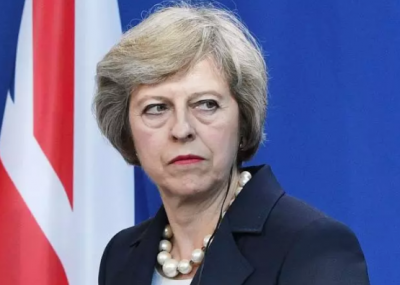Escalating Economic Warfare: Theresa May to Ban Russian Sovereign Debt Sales in UK?

Is this the next shoe to drop? Will the Trump administration follow suit, officials of both countries pressuring others to impose a similar ban?
Theresa May reportedly is considering a UK ban on Russian sovereign debt, escalated economic war if imposed, perhaps further illegal sanctions on Russian individuals and entities at the same time.
According to Harvard Society of Fellows research fellow Emile Simpson, “Russia can borrow in EU and US capital markets despite western sanctions and then can support the sanctioned Kremlin-linked banks and energy companies that can no longer do so.”
UK parliament’s foreign affairs select committee chairman Tom Tugendhat called for closing a loophole, letting Russian banks sell eurobonds to finance the country’s sovereign debt, saying:
“One of the ways that people are getting their money out of this country is by allowing Russian sovereign debt to be sold in the UK, and that debt to be used to reimburse Russians, in a way, to bring back their money onshore, in Moscow terms…We are…enabling those bond auctions, those debt auctions.”
Critics of the proposal say Russia will go elsewhere to sell its bonds, notably China.
A US Treasury study of the issue opposed sanctioning Russian debt, fearing a negative effect on financial markets.
Last December, Russia’s Finance Minister Anton Siluanov said talks with China were held on selling yuan bonds worth $1 billion in 2018, perhaps the first offering of more to come.
Deputy Finance Minister Vladimir Kolychev said Beijing expressed interest in the idea.
Separately, Russian Direct Investment Fund head Dirill Dmitriev explained Vladimir Putin supported the idea of creating an investment vehicle in yuan.
A Sino/Russia investment fund already made 19 investments, things going smoothly.
Last July, the Russian Direct Investment Fund and China Development Bank established a joint 68 billion yuan ($10 billion) investment fund as part of Beijing’s “One Belt, One Road” initiative.
Both countries may also cooperate in establishing payment systems, linking Russia’s system with China’s.
Moscow’s over dependence on the West harms its political and economic security.
Paul Craig Roberts earlier explained “by accepting foreign capital and exposing the ruble to currency speculation, Washington made sure that the US could destabalize Russia with capital outflows and assaults on the ruble’s exchange value,” adding:
“Only a government unfamiliar with the neoconservative aim of US world hegemony would have exposed its economic system to such foreign manipulation.”
PCR’s current advice: “…Russia should turn her back, but not her eyes, on the West, stop responding to false charges, evict all Western embassies and every other kind of presence including Western investment, and focus on relations with China and the East.”
Moscow should have followed this advice years ago – instead of letting the country be entrapped in a US-led Western financial straightjacket, the sooner freed from it the better for its economy and security.
Foolishly believing East/West normalization is possible one day is a strategy of reckless economic, financial and political endangerment.
Washington, Britain and their imperial allies are sworn enemies of Moscow. Mass expulsions of Russian diplomats alone prove it.
Nothing suggests a positive change in Western policy ahead, things likely to worsen, not improve.
It bears repeating what’s important to stress. Russia’s future is East, not West.
Stephen Lendman is a Research Associate of the CRG, Correspondent of Global Research based in Chicago.
VISIT MY NEW WEB SITE: stephenlendman.org (Home – Stephen Lendman). Contact at [email protected].
My newest book as editor and contributor is titled “Flashpoint in Ukraine: How the US Drive for Hegemony Risks WW III.”

